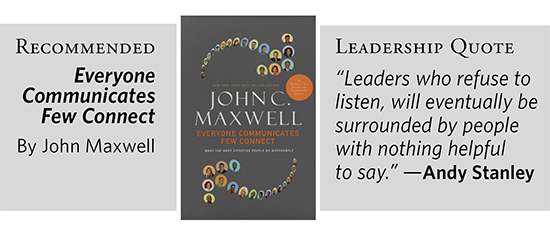
June-July 2021
Everyday Heroes
------------------
|





The column "Leadership Whiteboard" provides a short visual leadership coaching moment. It introduces and explains a new sketch in each issue, provides leadership coaching for further development, and shares a leadership quote and recommended book.
The Leader as Listener
About six issues ago, Leadership Whiteboard covered the leader as a reader. This issue explores the leader as a listener. Stereotypes tend to elevate the leader to a platform where she or he can be heard. After all, leaders are often viewed as “large and in charge,” setting the course, and not asking questions. However, some of the most gifted leaders are known for surrounding themselves with smart people and listening to their counsel when decisions are formulated. The following paragraphs provide quotes, values, and warnings for leaders.
Stephen Covey said, “Most people do not listen with the intent to understand; they listen with the intent to reply.” That statement may be more convicting than you wish to admit. Steve Jobs remarked, “It doesn’t make sense to hire smart people and then tell them what to do.” J. Oswald Sanders cautioned, “Many so-called leaders are too busy to listen. True leaders know that time spent listening is well invested.” These quotes remind us listening leaders cast vision, but they allow other brilliant people to add the tactical details of how that vision will be accomplished.

A listening leader exhibits several qualities. First, admit you don’t know everything and, consequently, need to listen. Second, respect people enough to hear and apply their insights. Third, recognize involvement in “the details” often leads to micromanagement. Fourth, ask others how to accomplish the vision.
Leaders need to hear the following warnings. President Eisenhower warned that it is difficult to listen when you feel the need to be heard: “You don’t lead by hitting people over the head—that’s assault, not leadership.” Ike commanded and won the greatest battles because he listened to his advisers. Be careful not to feign listening simply to appear you are allowing input. Finally, do not confuse listening with consensus-style leadership. Great leaders own the responsibility for casting vision and determining strategy, but allow input and consider advice when it comes to the tactics.
Remember, leading is not possible without followers, and followers bring value to the leadership equation.
About the Columnist: Ron Hunter Jr., Ph.D., is CEO of Randall House
Publications.

|
|

